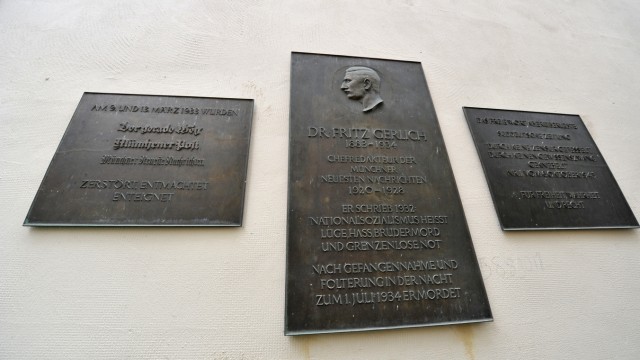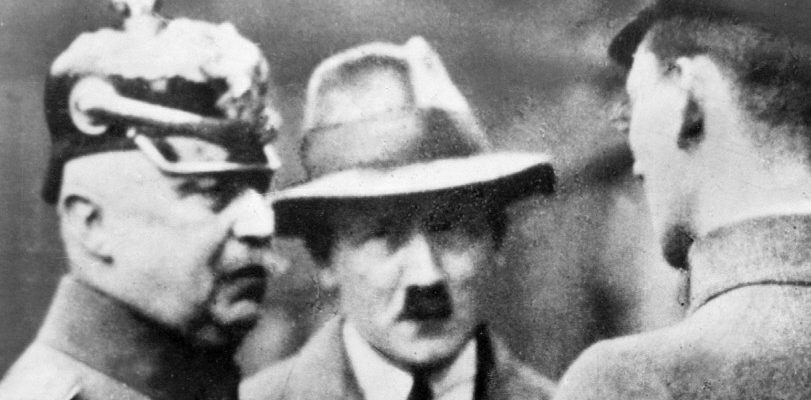There was a lot of excitement in the packed courtroom at the infantry school on April 1, 1924. “I see this acquittal as a disgrace for the coat and for the decorations of honor that I wear,” Erich Ludendorff slammed the court. The general appeared in uniform. The declaration – as eyewitnesses described it – triggered an outpouring of cries for healing. When Adolf Hitler, Friedrich Weber, Hermann Kriebel and Ernst Pöhner, who were sentenced to five years in prison, appeared at a window before being transported away, the crowd that had gathered on the street in front burst into cheers.
There would have been a lot of criticism in the verdicts in the so-called Hitler trial, in which the attempted coup of November 8th and 9th, 1923 was heard, when Adolf Hitler and Erich Ludendorff started a “March on Berlin” from Munich – with with the aim of overthrowing the democratic order and installing a dictatorship. The march was stopped at Odeonsplatz by the Bavarian police at gunpoint. More than a dozen coup plotters died, four police officers and a passerby were killed.
Ludendorff’s role in the racket was as clear as Hitler’s. Nevertheless, one was released immediately and the other, despite the high treason, was given the prospect of being released on parole after just six months if he behaved well. Wasn’t that ridiculous? Shouldn’t the enemies of the Republic see this as encouragement?
The Munich Latest News, the predecessor newspaper of the SZ, did not ask these questions. They gave a lot of space to reporting on the process. They documented the reasons for the judgment on three pages. There was also an editorial on the front page. In this he said: “We make no secret of the fact that our human sympathies are on the side of the defendants in this trial and not on the side of the November criminals of 1918.”
The piece, which is not marked by name, ends with the paragraph: “The men of November 1923 did not achieve actual success for themselves – yes, we cannot help but say that what they were striving for was out of date, was premature and therefore had to fail. Whether in Munich or on the northern border of Bavaria – their attempt would always have come to nothing because it did not properly take into account the foreign or domestic political situation. They misunderstood the national necessities and despite their respectable wishes, the law had to become master of them…”
“Respectable desire” that was merely “premature”? “Sympathies” for the opponents of democracy and, on the other hand, the “November criminals” – a political fighting term of the right-wing extremists, which they used to describe the democratic revolutionaries of 1918?
Reading it actually makes you wonder, especially since… Munich Latest News previously had the reputation of having “turned sharply against National Socialism” after 1923, as the historian Paul Hoser, among others, noted for the Historical Lexicon of Bavaria in 2006 and as the Munich NS Documentation Center stated on its homepage still currently being transported.
On the occasion of the centenary of the verdict this week, a prominent Munich resident drew attention to the historical uncertainty: Christian Ude, 76, mayor of Munich from 1993 to 2014. Ude has a very personal connection to the topic, in which another prominent Munich SPD politician plays a central role: Hans-Jochen Vogel, Munich’s mayor from 1960 to 1972.
The former mayors of Munich Christian Ude (left) and Hans-Jochen Vogel at a joint meeting in 2017.
(Photo: Stephan Rumpf)
Christian Ude completed a traineeship at SZ at the end of the 1960s and then worked there as an editor. After a controversy in which he accused Vogel of gaps in the city’s historical work relating to the 1920s, Vogel warned him about the comment on the Hitler Putsch, which – due to the lack of name recognition – could be understood as a statement from the entire editorial team and which was unusual in its clarity for a non-partisan press product in 1924. The topic of historically coming to terms with the Nazi era remained a big one for Vogel until his death in July 2020.
“It really bothered Hans-Jochen,” says Christian Ude. The question of whether Social Democrats had done enough in the resistance was raised by Vogel because of the “self-preservation of the South German newspaperAccording to Ude, Vogel never discussed this publicly, but gave it to him as a legacy on the anniversary of the Hitler trial.
The SZ has been published since October 1945. It took over the buildings and printing press Munich Latest News (MNN). In order to signal a political and journalistic new beginning, it initially appeared without any explicit reference to the MNN, but since 1951 there has been a reference to its predecessor in the newspaper header.

Memorial plaques for the first copy of the Süddeutsche Zeitung and the journalist Fritz Gerlich, who was murdered by the National Socialists, at the Hofstatt.
(Photo: Catherina Hess)
The memory of Fritz Gerlich, MNN editor-in-chief from 1920 to 1928, who described Hitler’s coup attempt in 1923 as “one of the greatest betrayals of German history” in an article and was murdered by the Nazis in the Dachau concentration camp in 1934, was multifaceted by the SZ maintained – including a bronze plaque on the former publishing house.
In order to create transparency, the SZ is documenting the editorial that appeared under Fritz Gerlich’s aegis on the verdicts in the Hitler trial in its entirety online. It is still unclear who wrote it. The SZ now wants to investigate this question.

